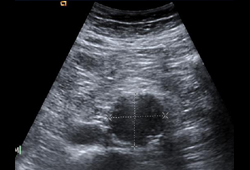Summary
Definition
History and exam
Key diagnostic factors
- palpable pulsatile abdominal mass
Other diagnostic factors
- abdominal, back, or groin pain
- hypotension
Risk factors
- cigarette smoking
- hereditary/family history
- increased age
- male sex (prevalence)
- female sex (rupture)
- congenital/connective tissue disorders
- hyperlipidemia
- COPD
- atherosclerosis (i.e., coronary artery disease [CAD], peripheral arterial occlusive disease)
- hypertension
- central obesity
- nondiabetic
- fluoroquinolone antibiotic use
- aneurysms elsewhere in the body
Diagnostic tests
1st tests to order
- abdominal ultrasound
Tests to consider
- computed tomography angiography (CTA)/CT
- positron emission tomography-computed tomography (PET-CT)
- erythrocyte sedimentation rate (ESR)/C-reactive protein (CRP)
- CBC
- blood cultures
Treatment algorithm
ruptured AAA
symptomatic, but not ruptured AAA
incidental finding: small asymptomatic AAA
incidental finding: large asymptomatic AAA
endovascular repair leak requiring treatment
Contributors
Expert advisers
Professor Anahita Dua, MBCHB, MS, MBA, FACS
Associate Professor of Surgery
Massachusetts General Hospital/Harvard Medical School
Department of Vascular and Endovascular Surgery
Boston
MA
Disclosures
AD declares that she has no competing interests.
Acknowledgements
Professor Anahita Dua would like to gratefully acknowledge Professor Matt Bown, Mr Andrew Duncan, Dr Maureen K. Sheehan, Dr Dawn M. Barnes, and Dr Gilbert R. Upchurch, previous contributors to this topic.
Disclosures
MB has grant funding from the British Heart Foundation and the National Institute for Health Research. AD, MKS, DMB, and GRU declare that they have no competing interests.
Peer reviewers
Ross Naylor, MBBS
Professor of Vascular Surgery
Vascular Surgery Group
Division of Cardiovascular Sciences
Leicester Royal Infirmary
UK
Disclosures
RN declares that he has no competing interests.
William Pearce, MD
Chief of Division of Vascular Surgery
Department of Surgery
Northwestern Memorial Hospital
Chicago
IL
Disclosures
WP declares that he has no competing interests.
Peer reviewer acknowledgements
BMJ Best Practice topics are updated on a rolling basis in line with developments in evidence and guidance. The peer reviewers listed here have reviewed the content at least once during the history of the topic.
Disclosures
Peer reviewer affiliations and disclosures pertain to the time of the review.
References
Key articles
Wanhainen A, Van Herzeele I, Bastos Goncalves F, et al. Editor's choice -- European Society for Vascular Surgery (ESVS) 2024 clinical practice guidelines on the management of abdominal aorto-iliac artery aneurysms. Eur J Vasc Endovasc Surg. 2024 Feb;67(2):192-331.Full text Abstract
Owens DK, Davidson KW, Krist AH, et al; US Preventive Services Task Force. Screening for abdominal aortic aneurysm: US Preventive Services Task Force recommendation statement. JAMA. 2019 Dec 10;322(22):2211-8.Full text Abstract
Isselbacher EM, Preventza O, Hamilton Black J 3rd, et al. 2022 ACC/AHA guideline for the diagnosis and management of aortic disease: a report of the American Heart Association/American College of Cardiology Joint Committee on Clinical Practice Guidelines. Circulation. 2022 Dec 13;146(24):e334-e482.Full text Abstract
Chaikof EL, Dalman RL, Eskandari MK, et al. The Society for Vascular Surgery practice guidelines on the care of patients with an abdominal aortic aneurysm. J Vasc Surg. 2018 Jan;67(1):2-77.e2.Full text Abstract
Reference articles
A full list of sources referenced in this topic is available to users with access to all of BMJ Best Practice.

Differentials
- Diverticulitis
- Ureteric colic
- Irritable bowel syndrome (IBS)
More DifferentialsGuidelines
- 2024 ESC guidelines for the management of peripheral arterial and aortic diseases
- EACTS/STS guidelines for diagnosing and treating acute and chronic syndromes of the aortic organ
More GuidelinesVideos
Tracheal intubation: animated demonstration
Bag-valve-mask ventilation: animated demonstration
More videosPatient information
Abdominal aortic aneurysm
More Patient informationLog in or subscribe to access all of BMJ Best Practice
Use of this content is subject to our disclaimer